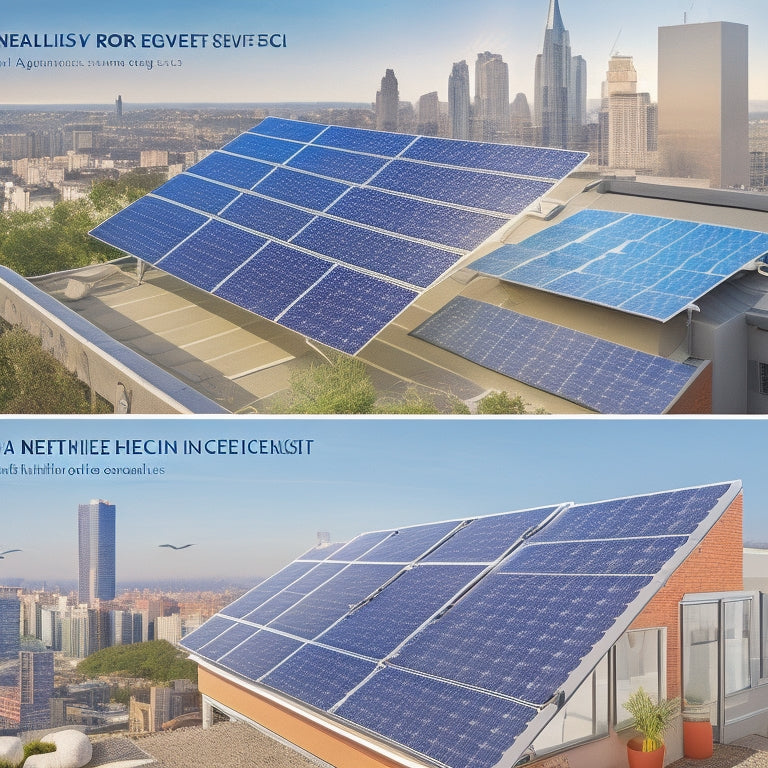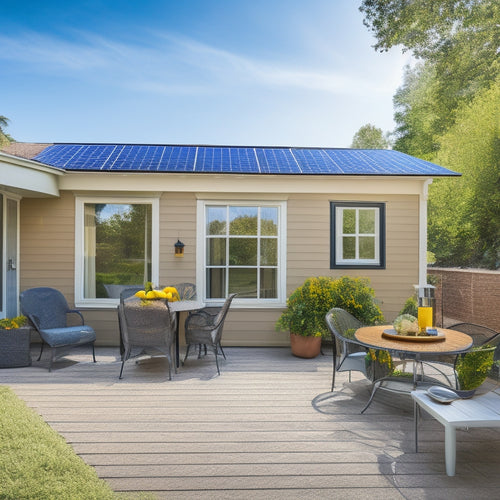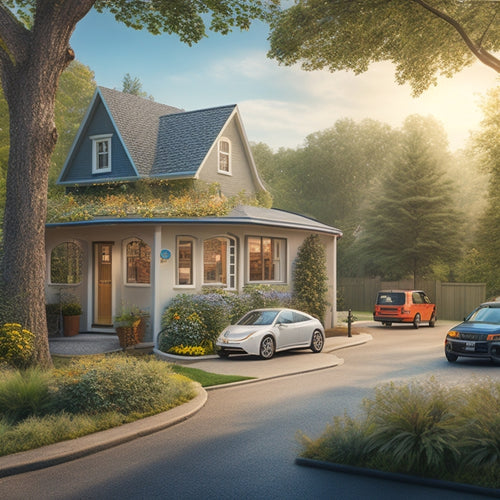
Top 3 Factors Affecting Home Solar Installation Cost
Share
Your solar panel installation cost is largely determined by three key factors: the system size and quality that meets your energy needs, the complexity and condition of your roof, and the local labor costs and incentives that affect the installation process. You'll need to balance system size with high-efficiency panels to maximize energy production while keeping costs in check. Roof details, condition, and orientation also impact installation costs, while local labor costs and incentives can either increase or decrease your upfront investment. Now that you know the top factors, understanding how they intersect will help you optimize your solar installation.
Key Takeaways
- System size and quality significantly impact installation cost, as larger systems don't always guarantee better performance, and high-efficiency panels come at a higher cost.
- Roof complexity and condition influence installation costs, with intricate roofs, old or damaged roofs, and specific roofing materials requiring more labor and resources.
- Local labor costs and incentives vary by region, city, and neighborhood, affecting the overall installation cost, with rebates and tax credits available in some areas.
- The ideal system size must align with energy needs and electricity usage to ensure optimal performance and cost-effectiveness.
- Accurate estimates depend on understanding roof intricacies, local labor costs, and available incentives to provide a precise installation cost.
System Size and Quality
Determining the ideal system size and quality is essential when considering a home solar installation, as these factors greatly impact the overall cost.
You'll want to verify the system is customized to your energy needs, factoring in your electricity usage and the amount of sunlight your location receives. A larger system doesn't always mean better, as it may not be necessary to cover your energy requirements. Instead, focus on finding the best balance between system size and quality.
When it comes to quality, solar panel efficiency plays a significant role. High-efficiency panels can generate more power per hour of sunlight, resulting in a smaller system size. However, they often come at a higher cost.
You'll need to weigh the benefits of increased efficiency against the added expense. Additionally, the installation technology used can also impact the overall cost. Advanced installation technology, such as tracking systems, can increase energy production but may require a larger upfront investment.
Roof Complexity and Condition
Your roof's intricacy and state greatly impact the cost of your home solar installation. The more intricate your roof, the more installation challenges you'll face, and the higher the cost. For instance, a roof with multiple levels, skylights, or unusual angles will require more time and materials, increasing the overall cost.
Additionally, the condition of your roof affects the installation process. If your roof is old, damaged, or near the end of its lifespan, you may need to replace it before installing solar panels, which adds to the overall expense.
Roof orientation is another vital factor. If your roof receives partial shade or has an unfavorable orientation, you may need to install more panels or use specialized equipment to optimize energy production, increasing the cost.
Moreover, the type of roofing material you have can also impact the installation process. For example, tile or slate roofs may require additional labor and materials to guarantee a secure and waterproof installation.
Understanding the intricacies and conditions of your roof is essential to getting an accurate estimate for your home solar installation.
Local Labor Costs and Incentives
As you consider the complexities of your roof, it's equally important to factor in the costs associated with the professionals who'll bring your solar installation to life.
Local labor costs can vary considerably depending on the region, city, or even neighborhood you're in. These costs include the fees for installation permits, which can range from a few hundred to several thousand dollars, depending on the complexity of the project and the local authorities' requirements.
Additionally, regional incentives can also impact the overall cost of your solar installation. Some states or cities offer rebates, tax credits, or other incentives that can help offset the upfront costs of going solar.
For instance, California's Solar Initiative offers rebates to homeowners who install solar panels, while New York State provides a tax credit of up to $5,000 for residential solar installations.
When evaluating local labor costs and incentives, it's crucial to research the specific programs and policies in your area to maximize your savings.
Frequently Asked Questions
Can I Install Solar Panels Myself to Save Money?
You can attempt a DIY solar installation, but be aware of the installation challenges, such as electrical connections and roof integrity, that may lead to safety risks, voided warranties, and reduced system efficiency, ultimately negating potential cost savings.
How Long Does a Typical Solar Panel Installation Take?
You'll typically spend 2-5 days waiting for permits, and another 1-3 days for the actual installation, depending on the installation timeline and complexity of your rooftop, but most homeowners can expect a smooth process with a reputable installer.
Do Solar Panels Work During Power Outages?
You're wondering if solar panels work during power outages. Typically, they don't, as they're grid-tied and shut down for safety reasons. However, you can opt for battery backup systems or generators as power outage solutions to maintain solar panel functionality.
Can I Add More Panels to My Existing System?
Think of your existing solar setup as a strong foundation, waiting to be built upon! You can indeed add more panels, but first, assess your system's panel capacity to guarantee a seamless system expansion, maximizing your energy output.
Will Solar Panels Increase My Property Taxes?
You're wondering if solar panels will increase your property taxes; fortunately, in most states, the added value from solar energy benefits won't impact your property tax implications, so you can enjoy the savings without worrying about a tax hike.
Related Posts
-

10 Tips to Buy Affordable Solar Panels Online
When purchasing affordable solar panels online, you'll want to research reputable retailers, compare prices, and chec...
-

Why Nearby EV Conversion Shops Matter to You
Having a nearby EV conversion shop means you'll experience the benefits of a more personalized, convenient, and susta...
-

Why Cities Need Smart Charging Infrastructure Now
You're about to experience a tidal wave of electric vehicles hitting your city's streets, and it's essential you're p...


